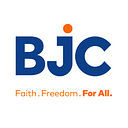Bringing Our Whole Selves: Faith Freedom in the Next Generation
By Jaziah Masters

History can be a lamp unto our feet and a light unto our path, offering perspective and in many ways comfort. Every Black History Month allows us to intentionally reflect on the heritage that we as African Americans have inherited. This is a proud legacy washed anew with every generation. In a world where “unprecedented” seems to be the new normal, I find comfort in looking back on my history, so much of which is still relatively unknown.
I have just read Lost Prophet: The Life and Times of Bayard Rustin and it still amazes me that one of the most important figures of the American civil rights movement is relatively anonymous. How can a man who taught Martin Luther King Jr. the methods of Gandhi, spearheaded the 1963 March on Washington and championed the causes of economic justice and world peace face obscurity?
Rustin faced marginalization not because of personal shortcomings, but because of his sexuality. As a Black gay man, I too am familiar with this shortcoming of organized religion. Yet, knowing the mistakes of the past can help us to ensure they are not repeated. Rustin’s story can still be one of hope to those who come after. I believe his case to be a prime example of a generational shift of faith freedom.
I am encouraged by the Voices of Black Faith Freedom series. In the third conversation, Dr. Timothy “Tee” Boddie and Maya Boddie agreed that learning never stops, and each generation has something to learn from the other. Now is the time for all of us to learn together how religious liberty for all underlines an institution that has sustained a people for generations.
The message that most struck me in the PBS Documentary The Black Church was the institution’s sustainability through the generations. I attribute that to its flexibility and evolution over time. Paving the way is religious liberty: the right to worship, or not, how one sees fit. This faith freedom allowed African Americans to start and change religious practices that best suited their needs. We see the fruits of this in the rich tapestry of religious expression across the diaspora today.
When Black people were denied churches outside the glare of oppression, they started their own. When Black women were denied leadership positions in congregations, they started their own. And when Black worshippers saw a faith stagnant and unwilling to respond to the needs of the time, they started new denominations such as the African Methodist Episcopal Church (AME) and later the Progressive National Baptist Convention (PNBC). At each juncture, religious liberty has allowed us to imagine something different and then make it our own. Because, in the words of Bishop Yvette Flunder, “What we don’t have, we must create.”
I am optimistic about the next chapter of the Black Church currently being written, and hopeful that an individual with the talents of Bayard Rustin could find a home in today’s Black Church and not be held to the background. Our faith must be big enough to include him and so many others throughout the Church’s history that were not recognized, affirmed, or supported. True faith freedom means bringing the entirety of our being to our search for the highest truth. That is our generation’s challenge.
What does faith freedom mean for my generation? I hope that it is an acknowledgment of the value of an individual bringing their entire personhood to worship, or not, as they see fit. In the last years of his life, Bayard Rustin repeated a statement he attributed to his friend and mentor A. Philip Randolph, another unsung civil rights hero, “The struggle must be continuous, for freedom is never a final act.” So too must this generation, and every other generation, recognize the worth of faith freedom for all.
Jaziah Masters is BJC’s advocacy and outreach manager.
